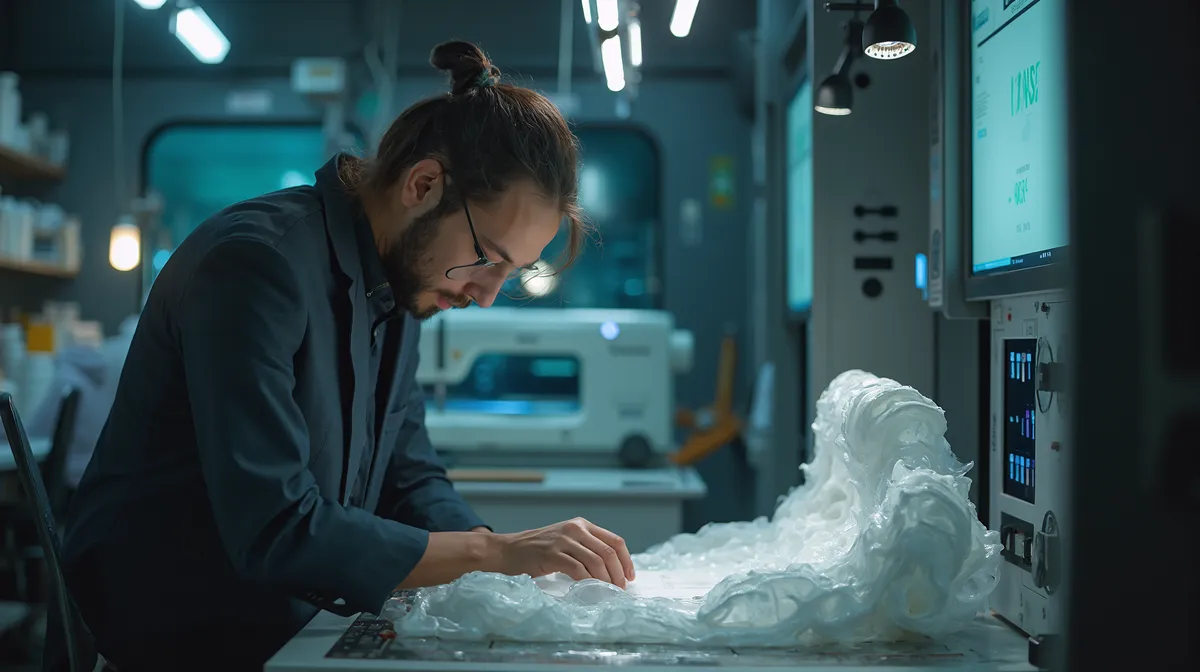

The Revolutionary Trends of Fashion Professions in 2024: A Complete Guide
mode - None
The Dynamic Evolution of Careers in the Fashion Industry
The fashion industry is undergoing a significant transformation, redefining traditional professional opportunities. The sector is experiencing remarkable growth of 21% in specialized job creation, particularly in digital and sustainable development.
Creative professions are undergoing a spectacular metamorphosis. The role of the fashion designer is becoming increasingly enriched, integrating 3D modeling and computer-aided design skills. This technological evolution is radically transforming creation and production processes.
The profession of professional model is adapting to new market demands. Agencies are seeking diversified profiles, capable of representing the industry's growing inclusivity. A notable change is observed in selection criteria, prioritizing authenticity and personality.
The Rise of Digital in Fashion Careers
The digital sector is revolutionizing the fashion industry. Digital marketing specialists are becoming indispensable, creating innovative strategies to connect brands with their audience. Mastery of social networks and data analysis represents a major asset for professionals in the sector.
E-commerce experts are shaping the future of fashion distribution. Online sales currently generate 35% of the sector's global revenue, requiring expertise in user experience and conversion optimization.
The most promising sectors include wearable technology, where textile engineers collaborate with designers to create intelligent clothing. This fusion of fashion and technology is opening up fascinating professional perspectives.
Sustainability: A New Pillar of Fashion Careers
Sustainable development experts are transforming the fashion industry. The demand for professionals specialized in circular economy and responsible resource management is increasing by 45% annually. These experts are developing innovative solutions to reduce the sector's environmental impact.
The role of the CSR manager is becoming central in fashion houses. These professionals oversee the implementation of ethical practices, from supply chain to product recycling. A notable quote from a sector leader: "Sustainable fashion is no longer an option, it's a necessity that redefines our professions."
Traceability consultants are emerging as key players. Their expertise ensures transparency in production processes, responding to consumers' growing demands for product origin and impact.
Innovation at the Heart of New Fashion Careers
Artificial intelligence is revolutionizing fashion careers. Data scientists analyze trends and predict consumer behavior, enabling brands to optimize production and commercial strategy.
Virtual fashion creators are inventing new forms of artistic expression. The creation of digital clothing for avatars and augmented reality experiences represents a rapidly expanding market, estimated to reach 50 billion euros by 2030.
Personalization specialists are developing tailored solutions thanks to 3D technologies. This quote from an expert illustrates this trend: "Mass personalization is becoming the norm, radically transforming the relationship between brands and their customers."
The Emergence of Hybrid Careers
Tech-stylists combine fashion expertise with technological skills. These professionals create collections integrating innovative features, such as self-regulating fabrics or connected clothing.
Trend experts are evolving towards more analytical roles. The use of artificial intelligence tools to predict trends is transforming this traditional profession into a highly technological one.
Omnichannel customer experience specialists orchestrate harmony between physical and digital sales. This new generation of professionals masters both traditional luxury codes and the latest technological innovations.

The Essential Skills for Success in Fashion
Adaptability is a fundamental quality for professionals in the sector. Recruiters prioritize candidates demonstrating continuous learning capabilities, particularly in the universe of international fashion events where trends evolve rapidly.
Mastery of specialized digital tools is an essential prerequisite. Software for 3D design, collaborative project management platforms, and data analysis tools represent the daily routine of professionals in the sector. A recent study reveals that 78% of fashion job offers mention specific digital skills.
Soft skills are taking on increasing importance in the industry. Creativity, emotional intelligence, and the ability to work in a multicultural team characterize the profiles sought by major fashion houses.
Geographic Opportunities in the Fashion Industry
The best cities for a fashion career are diversifying. Beyond traditional capitals like Paris, Milan, and London, emerging hubs like Shanghai, Seoul, and Dubai are creating new professional opportunities.
The Asian market is generating a growing demand for specialized talents. Professionals mastering local cultural codes while understanding international standards benefit from significant competitive advantages. An expert in the sector affirms: "Asia now represents 60% of the global luxury fashion market's growth."
Fashion innovation hubs are multiplying globally. These creative ecosystems bring together startups, specialized schools, incubators, offering enriching perspectives for professionals seeking to participate in the sector's transformation.
The Impact of Fashion Events on Careers
International fashion weeks constitute exceptional career accelerators. These events enable professionals to weave valuable networks, discover sectorial innovations, and identify emerging opportunities.
The London Fashion Week perfectly illustrates the evolution of fashion careers. The event now integrates technological showcases, conferences on sustainable innovation, and professional masterclasses, significantly enriching professional development perspectives.
Specialized trade shows are transforming into dynamic job platforms. These gatherings facilitate encounters between talents and recruiters, particularly in emerging fields like sustainable fashion or wearable technology.
Continuous Training and Professional Development
Professional certification programs are adapting to the sector's new realities. Online training, specialized boot camps, and intensive workshops enable professionals to quickly acquire sought-after skills. A study indicates that 85% of fashion professionals follow at least one specialized training program annually.
Mentorship is taking on increasing importance. Major fashion houses are developing structured programs allowing young talents to learn from experienced professionals. A human resources director testifies: "Mentorship significantly accelerates the development of critical skills in our industry."
Expertise in fashion technological innovations is becoming primordial. Professionals mastering emerging technologies like blockchain for traceability, augmented reality for retail, and artificial intelligence for personalization are positioning themselves advantageously in the market.
Future Evolution and Trends
The fashion metaverse is creating new professional trajectories. Digital creators, virtual experience specialists, and NFT fashion experts represent the most promising emerging careers, with growth prospects estimated at 300% over the next five years.
Mass personalization is transforming traditional professions. Predictive algorithms, 3D printing, and parametric design require hybrid skills, combining fashion expertise with advanced technological mastery.
Circular careers are gaining importance. Experts in upcycling, textile recycling specialists, and circular economy consultants are shaping the sustainable future of the fashion industry, responding to consumers' growing demands for responsible practices.